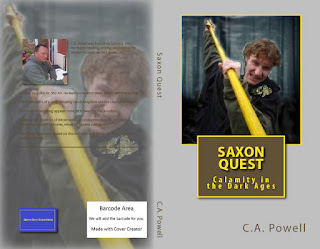I believe the legend of King Arthur comes from fact - he once existed, but I'm not sure if it was during the Dark Ages because Roman culture Britons would have been literate after four hundred years of speaking Latin. It does not seem feasible that Angle, Saxon, and Jutish kings were known of from the supposedly pagan English times, yet the learned Celtic Britons have no substantial record of the real King Arthur, the Arthur knights, the Arthur sword, Merlin the wizard, and of course the round table. I am no long sure of King Arthur of Cornwall and his queen, Guinevere living during the Dark Ages. After all, these were the ones who could put pen to paper at this time.
I have recently become sceptical of this mass migration of Anglo-Saxon tribes suddenly arriving in Britain when the Romans abandoned the Isle. I have seen documentaries where Saxon sites have been dug up and DNA samples of bones suggest Britons predominantly living in Saxon sites. This throws so many things into confusion and even the evolving of English language, from Frisian or what Dutch people speak.
Some historians of language think it was adopted with heavy British (ancient Welsh) influence. How this was explained was a little beyond me, but there seems to be a general agreement that pagan English tribes were already in the south east of Britain or speaking such a dialect when Rome still ruled. Were these people Christian because by this time Romans and Britons were? Names of Teutonic Gods would suggest that there was a pagan belief, but not the old British Druid system of religion. Therefore this Teutonic religion must have been imported. There are so many unanswered questions especially skeletons of Saxon settlements being mainly Briton in DNA testing.
However, as said previously, much of the DNA is still Celtic British. I wonder if Arthur and his legend were old even during these times - a folk tale back then and perhaps Saxons, Angles and Jutes replaced Romans as the enemy of Arthur's kingdom. I honestly think this mythical king of Celtic Britons was around before, English language or pagan English tribes were in Britain.
Perhaps Angles, Saxons, and Jutes speaking a strange tongue and believing in an un-Christian religion would have found themselves ostracised by Romanised Britons who were literate in Latin. Why write off these people yet not Arthur? I think he would be much more chronicled if he lived in the Dark Ages.
This is the reason I did not mention such a British Celtic King by name in the novel Saxon Quest. I think two cultures clashed in Dark Age Britain, but I can't commit to there being a King Arthur of this time. I believe he goes much further back.





No comments:
Post a Comment